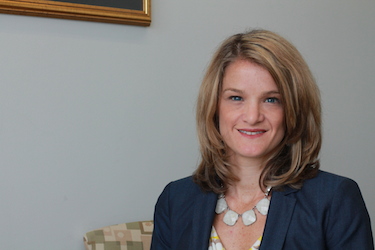 |
|
|
Nancy Byatt, DO, MS, MBA |
With depression affecting up to one in five women during and after pregnancy, expectant mothers and their doctors must weigh the known risks of untreated depression for the mother and the baby against the safety of antidepressant medications for the growing fetus.
Perinatal depression expert Nancy Byatt, DO, MS, MBA, is urging calm after the release of a large-scale study that found a link between increased incidence of autism spectrum disorder (ASD) in children of women who use antidepressants while pregnant.
Published in JAMA Pediatrics, the study finds an 87 percent increase in autism spectrum disorders in children exposed to antidepressants in the second and third trimesters of pregnancy.
The findings are being met with skepticism by some experts, who caution against the authors’ interpretation of the results. Dr. Byatt, assistant professor of psychiatry and obstetrics & gynecology at UMass Medical School, noted that there is no evidence of a causal relationship between antidepressants and ASDs, and that while an increased relative risk was found, the absolute risk remains very low at less than 1 percent.
“The take-home point from the study is that there continues to be a question as to whether use of selective serotonin reuptake inhibitors (SSRIs) during pregnancy increases the risk of autism,” said Byatt, who serves as medical director of the Massachusetts Child Psychiatry Access Program for Moms (MCPAP for Moms). “However, the increased risk of autism demonstrated by the study is very small.”
Multiple classes of antidepressants were included in the study, which found that the increased risk of ASDs occurred with use of SSRIs and in children of mothers who used more than one class of antidepressant during pregnancy. Forty-six of the 1,054 children diagnosed with ASD were exposed to antidepressants in utero; 22 of those were exposed in the second and third trimesters.
Byatt is among the epidemiologists and psychiatrists who say the study is flawed and will cause unnecessary consternation among women already faced with a challenging diagnosis of perinatal depression.
“This study has several limitations and no study is perfect or can be absolute. Maternal depression itself has also been associated with an increased risk of autism,” said Byatt, who cited other studies that did not show an association between antidepressant use in pregnancy and ASDs.
A psychiatrist who has cared for hundreds of women with depression during and after pregnancy, Byatt employs the full range of available treatments. Patients participate in weighing the risks of perinatal depression versus gestational exposure to medication against their personal histories and values in order to reach a mutual, patient-centered decision on a treatment plan that may or may not include SSRIs or other classes of antidepressant medications.
“A careful and thoughtful discussion about the risks of illness itself is essential. No decision regarding whether to use antidepressants during pregnancy is perfect or risk free,” Byatt concluded. “Getting help is the best thing an expectant mom can do for herself and her baby.”
Related links on UMassMedNow:
Byatt tells Reuters Health new study will help pregnant women decide about antidepressants
Expert’s Corner: Consider all options for treating depression during pregnancy
More help on the way for Mass. women with depression during and after pregnancy
Byatt to Telegram & Gazette: postpartum depression can interfere with mother-child bond